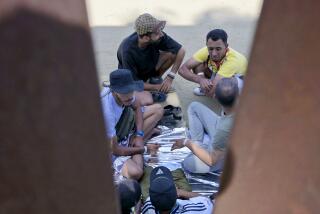U.S. Judge Orders the Release of 8 in Palestinian Case
- Share via
In a major setback for the government, a federal judge on Tuesday allowed seven Arab immigrants and a Kenyan released from prison until their deportation hearing, despite pleas from the prosecutor that the eight were “a risk to national security.”
U.S. Immigration Judge Roy J. Daniels repeatedly asked the government lawyer to disclose what evidence authorities had to justify keeping the eight in prison without bond--a position urged by the prosecution for each defendant.
But Melainie Fitzsimmons, the Immigration and Naturalization Service attorney trying the case, told the bond hearing that on orders of U.S. Atty. Gen. Edwin Meese III, she could talk only to the judge and in private because of national security interests.
“Tell me what you can,” Daniels said over and over during a dramatic afternoon hearing in a tiny courtroom in the downtown Federal Building.
But Fitzsimmons, in a voice barely audible to the crowded room, held firm.
“I can’t tell you,” she declared. “I have been ordered to do it that way by the attorney general of the United States.”
Under Meese’s instructions, Fitzsimmons explained, the government could only disclose the details of its case to the judge in secret--excluding everyone, including the defendants, defense lawyers, the public and the news media.
At one point, obviously frustrated, Fitzsimmons offered to approach the bench and outline the government’s justification for withholding bond out of earshot of defense attorneys. But Daniels refused her request, saying, “I’m going to ask you to do that in public.”
Afterward, Fitzsimmons told reporters that she was “extremely disappointed” with the way the judge allowed all eight defendants to go free. She declined to comment further.
At the conclusion of the hearing, the seven men and one woman--all but one arrested by federal agents on Jan. 26, the other Thursday--smiled and embraced each other. Their hands were then chained behind their backs and they were led away by INS guards to be returned to Terminal Island Federal Prison to be processed out on bail.
At a noon rally outside the Federal Building, more than 200 demonstrators marched in support of the defendants, carrying banners that read “Defend our civil liberties” and “No more Arab scapegoats.”
The otherwise peaceful protest was marred by two arrests after confrontations between the protesters and a few members of the Jewish Defense League. No one was hurt.
All of the defendants are accused of being “a member of or affiliated with” a faction of the Palestine Liberation Organization, “an organization that advocated the . . . doctrines of world communism. . . . “
The faction is the Marxist Popular Front for the Liberation of Palestine, which has had a history punctuated with violence, primarily during the 1970s in the Middle East.
All of the defendants have denied through their lawyers any association with the Popular Front.
The eight face deportation under the 35-year-old Immigration and Nationality Act because they allegedly wrote for or circulated in the United States two publications--one in English, the other in Arabic--that support the Popular Front.
Fitzsimmons, in trying to persuade the judge to keep the eight in prison until their deportation hearing in April, painted a picture of the Popular Front as “an international Marxist/Leninist terrorist organization” designed to overthrow both the governments of the United States and Israel.
Additionally, she offered the judge a private look at a still-secret FBI report apparently laying much of the case’s foundation. But Daniels declined to read it.
Fitzsimmons told the court that Khader Musa Hamide, 32, of Glendale was the Popular Front’s alleged leader “in California and parts of Arizona” and poses a threat “to national security” and to the public generally. Hamide, Fitzsimmons alleged, immigrated to Seattle from the West Bank on Sept. 28, 1971, “as a member of the Popular Front.”
She painted a picture of Hamide, as she did with the other defendants, as being actively involved in Popular Front fund-raising, demonstrations, education, public speaking and the distribution of literature.
“The gun is the method to achieve their aims,” she told the court in describing the Popular Front.
Without giving a precise time frame or other specifics, she said Hamide was instrumental in sending a Palestinian living in the United States abroad to attend a meeting involving the Popular Front.
Fitzsimmons said she had at least two witnesses, whom she would not name, to bolster her case: an FBI agent and an individual known to the defendants “who was afraid for his life.”
But Judge Daniels said Fitzsimmons had failed to prove that the eight either would jump bail or were a threat to the national security or anyone in particular.
At one point, an exasperated Daniels admonished Fitzsimmons, asserting “it bothers me that the government isn’t telling the court why (the defendants) are a flight risk” and should be denied bond.
In the end, five of the eight defendants were released Tuesday night on their own recognizance, without having to post any bond, until their deportation hearing, which is tentatively scheduled for April 28. The five are: Hamide, a business administration graduate from the University of Oregon who was attempting to put together a marketing firm here; his wife, Julie Nyangugi Mungabh, 28, an accountant for Toyota Motor Corp.; Amjad Mustafa Obeid, 23, an engineering student at California State University, Long Beach; his brother, Ayman, 24, also an engineering student at the same school, and Michel Ibrahim Nasif Shehadeh, 30, a journalism student at Cal State Long Beach.
Three others were required to post a bond and were expected to be released today. They are Bashar Husam Amer, 24, a pharmacy student at Chaffey Community College in the San Bernardino County community of Alta Loma, $3,000 bond; Naim Nadim Sharif, 26, Northridge, a former student at Glendale Community College, $2,000, and Aiad Khaled Barakat, 26, of Northridge, who is in partnership with his brother in a Sun Valley masonry firm, $500.
More to Read
Sign up for Essential California
The most important California stories and recommendations in your inbox every morning.
You may occasionally receive promotional content from the Los Angeles Times.










